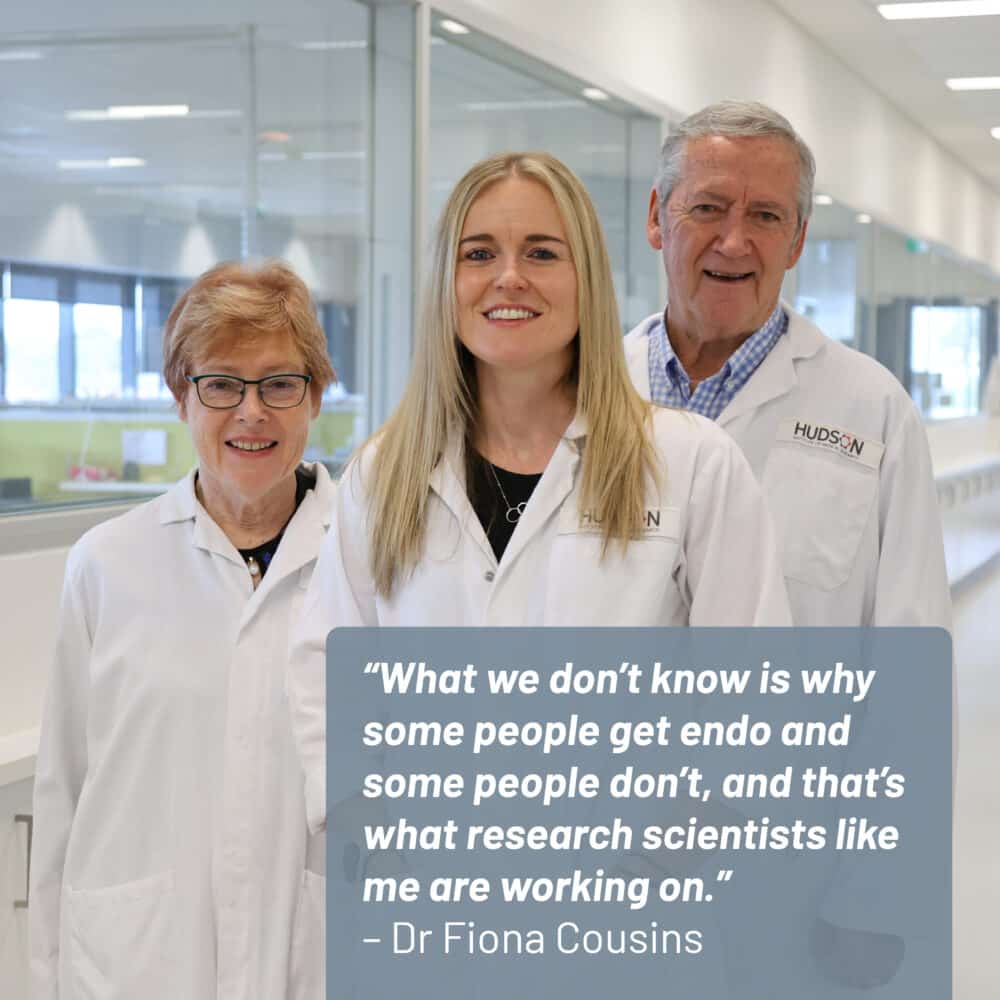When science meets innovation: cell therapies
By Hudson Institute communications
Leading Australian stem cell researcher, Dr Rebecca Lim has just returned from Toronto, the global centre of cell therapies research and a hotbed of innovation and start-ups. She shares what happens when science meets innovation and commercialisation.
You’ve just been to Toronto, Canada to visit the Centre for Commercialisation of Regenerative Medicine. What was the event?
I was part of the delegation representing the Australian Node of the Centre for Commercialisation of Regenerative Medicine (CCRM), along with delegates from the Australian Regenerative Medicine Institute, Scinogy, St Vincent’s Institute, Cell Therapies and MTP Connect.
We were invited to represent Australian regenerative medicine at an unveiling of a new sculpture of the fathers of stem cell science, Till and McCulloch, and the opening of the new CCRM laboratory space.
Professors James Till and Ernest McCulloch discovered the existence of stem cells in 1961 when studying the effects of radiation on the bone marrow at the Ontario Cancer Institute. It was an honour to be invited to this unveiling and to spend some time with Prof Till after the unveiling.
Why were you invited to attend this event?
I was invited by CCRM because of their interest in our patents on exosome therapeutics
– an emerging field that provides a cheaper and more accessible alternative to stem cell therapy. Exosome therapeutics has been found to be highly effective in models of fibrotic diseases affecting the heart, liver and lungs.
Why are science labs located alongside 100 plus start-ups in Toronto?

The parent node of CCRM is on the 10th floor of the MaRS Discovery District in Toronto – the world’s largest urban innovation hub. The MaRs Discovery District houses more than 100 tech start-ups on a single site of 1.5 million square feet.
MaRS sees itself as a bridge between invention and adoption, so it makes perfect sense that CCRM should be housed in an ecosystem of innovation and entrepreneurship. Aside from start-ups, MaRS also houses venture capital firms such as Real Ventures and corporate offices of some of established names in innovation such as Facebook and Airbnb.
A fantastic space at MaRS is J-Labs, which is a completely disruptive model for the biotech and innovation sector. It takes science start-ups out of academic settings where they can access top-notch lab space without complex operational costs. This was a real eye-opener for me!
Why is Canada important for stem cell science?
When one thinks of stem cell science, one does not necessary consider Canada a major landmark on the global map. In fact, the field of stem cell science was not only born in Canada, but one of the major stem cell companies, STEMCELL Technologies Inc. was also Canadian-born. The company is the brainchild of Prof Allen Eaves, a hematopoietic stem cell researcher at Terry Fox Laboratories.

When the inadequacies of commercially available cell culture media became too frustrating for Prof Eaves, he turned to making his own reagents, which he then supplied first to local colleagues and then international colleagues.
With the encouragement and support of Terry Fox Laboratories, he mortgaged his home and developed his company, STEMCELL Technologies. Today, that company has more than 1000 employees globally. Imagine where Prof Eaves would be today if all he did was complain about the sub-standard reagents and made do with what he had on hand? Canada is vital for stem cell science because it has success stories like these, where inventors are surrounded by encouraging peers and embedded in an ecosystem of innovation.
A more recent example of the impact of such an innovative culture is the launch of CCRM-partnered BlueRock Therapeutics which raised US$225 million in its Series A financing – one of the biggest for the biotech sector. I encourage my science colleagues who are thinking about commercialisation to consider partnerships in Canada where innovation and entrepreneurship is fostered far beyond incubator programs. This is a great model that we need to be looking to replicate in Australia.
Contact us
Hudson Institute communications
t: + 61 3 8572 2697
e: communications@hudson.org.au
About Hudson Institute
Hudson Institute’ s research programs deliver in five areas of medical need – inflammation, cancer, reproductive health, newborn health, and hormones and health. More
Hudson News
Get the inside view on discoveries and patient stories
“Thank you Hudson Institute researchers. Your work brings such hope to all women with ovarian cancer knowing that potentially women in the future won't have to go through what we have!”




